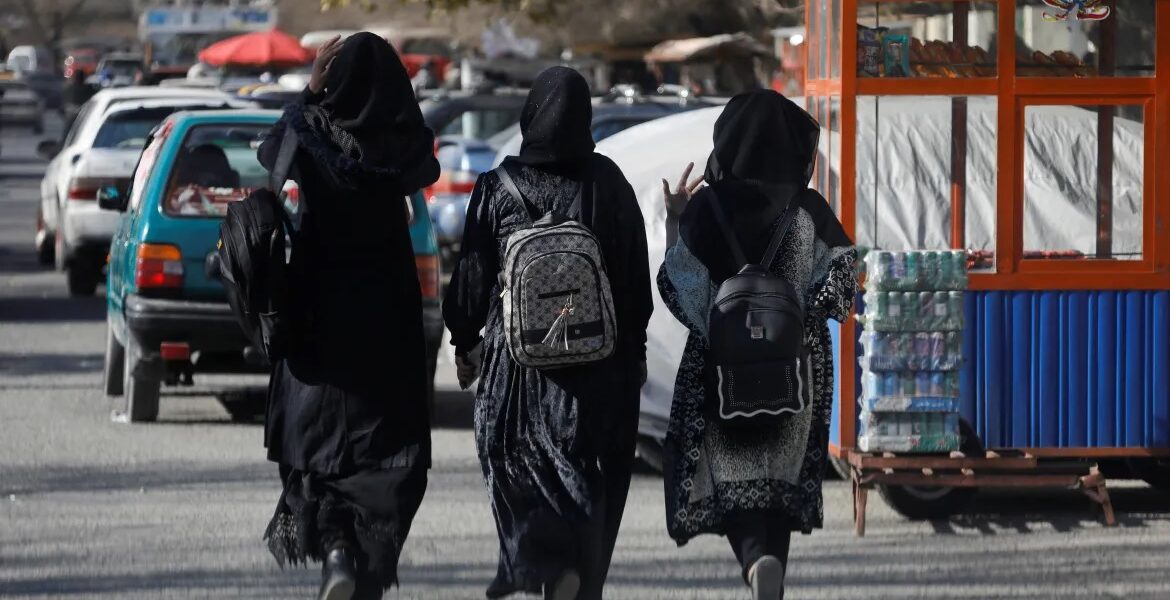The Taliban has ordered a ban on women from being able to attend university or girls primary school in Afghanistan in the latest blow to women's rights and freedoms in the country.
Although the radical Islamist group promised more moderate rule and respect for women's rights, they have widely implemented their interpretation of Shariah Law since seizing control of the country in 2021.
They banned girls from middle school and high school, restricted women from most employment, and ordered them to wear head-to-toe clothing in public.
Women were also banned from parks and gyms and prevented from travelling without a male relative.
A letter, confirmed by a spokesperson for the higher education ministry, instructed Afghan public and private universities to suspend access to female students immediately, in accordance with a Cabinet decision.
The ban on higher education comes weeks after Afghan girls sat university entrance exams across the country. Until now, some women had been allowed to continue their university studies, but in gender-segregated classrooms.
"I can't fulfil my dreams, my hopes. Everything is disappearing before my eyes, and I can't do anything about it," said a third-year journalism and communication student at Nangarhar University. She did not want to be identified for fear of reprisals.
"Is being a girl a crime? If that's the case, I wish I wasn't a girl," she added.
"My father had dreams for me that his daughter would become a talented journalist in the future. That is now destroyed. So, you tell me, how will a person feel in this situation?"
Human Rights Watch called the move "a shameful decision" that makes clear the Taliban's lack of respect for "the fundamental rights of Afghans."
Foreign governments, including the United States, have said that a change in policies on women's education is needed before it can consider formally recognising the Taliban-run administration, which is also subject to heavy sanctions.
"The Taliban cannot expect to be a legitimate member of the international community until they respect the rights of all Afghans, especially the human rights and fundamental freedom of women and girls," US Deputy UN Ambassador Robert Wood told the council, describing it as "absolutely indefensible."
Meanwhile, UN Secretary-General Antonio Guterres said he is "deeply alarmed" by the Taliban's move.
"The secretary-general reiterates that the denial of education not only violates the equal rights of women and girls, but will have a devastating impact on the country's future," his spokesman Stephane Dujarric said in a statement.
Slamming the Taliban, former US envoy for Afghanistan, Zalmay Khalilzad, said: "The announcement regarding women’s banishment from higher education by a faction within the Taliban is shocking and incomprehensible."
Britain's UN Ambassador Barbara Woodward said the suspension was "another egregious curtailment of women's rights and a deep and profound disappointment for every single female student."
"It is also another step by the Taliban away from a self-reliant and prosperous Afghanistan," she told the council.
In March, the Taliban drew criticism from many foreign governments and some Afghans for making a U-turn on signals that all girls' high schools would be opened.
UN spokesman Stephane Dujarric said the move on Tuesday was "clearly another broken promise from the Taliban".
"It's another very troubling movement and it's difficult to imagine how the country can develop and deal with all of the challenges that it has without active participation of women and the education of women," he said.
Shortly before the announcement, UN special envoy for Afghanistan Roza Otunbayeva said the closure of high schools had "undermined" the Taliban administration's relationship with the international community and was "extremely unpopular among Afghans and even within the Taliban leadership".
"As long as girls remain excluded from school and the de facto authorities continue to disregard other stated concerns of the international community, we remain at something of an impasse," she said.
One mother of a university student, who asked not to be named for security reasons, said her daughter called her in tears when she heard of the letter, fearing she could no longer continue her medical studies in Kabul.
"The pain that not only I … and [other] mothers have in our hearts, can not be described," she said.
"We are all feeling this pain."
READ MORE: Ekrem İmamoğlu Conviction - Provocative Erdoğan accuses the West of meddling in Turkish affairs.


